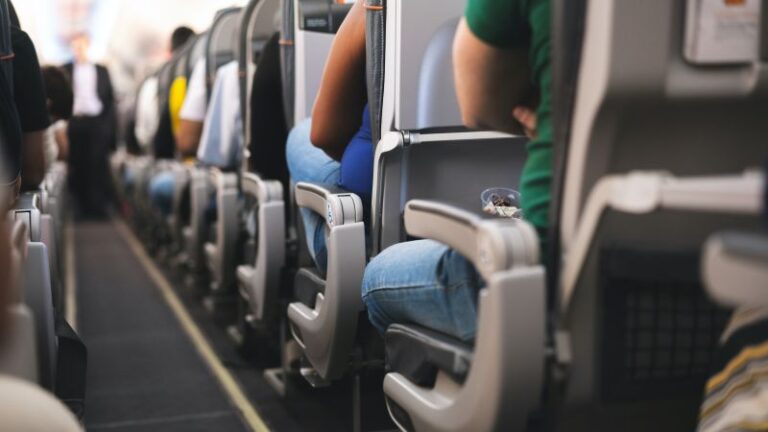
[ad_1]
They might not be the most exciting item to add to your packing list, but a good pair of compression socks is a must-have for anyone who finds themselves boarding flights on a regular basis.
Compression socks come with a number of benefits for frequent flyers that range from serious medical prevention to cosmetic and comfort factors. While doctors and orthopedic specialists agree that they aren’t absolutely vital for people with no prior medical conditions, compression socks are still considered to be a valuable travel tool for anyone hoping to make long flights a more comfortable experience.
We spoke with a handful of professionals to get their insights on the benefits of wearing compression socks while flying as well as some of the better compression socks on the market to look for based on your particular needs.
One of the most well-known perks of compression socks is how they can help to prevent blood clots, a worry for many when traveling by air. They work to stimulate circulation in the lower half, which is especially useful during long flights when you’re sitting for prolonged periods.
“Compression stockings and socks can promote comfort while traveling and be one of the easiest ways to avoid blood clots associated with deep vein thrombosis (DVT),” explains Dr. Bob Bacheler, managing director and flight nurse at Flying Angels. “Compression stockings/socks are elastic and as such help to prevent blood from pooling in the lower extremities, and prevent clots from forming.”
After a long flight, it’s common for your legs to take some time to get used to activity. Along with promoting circulation in your legs, compression socks also work to help fight the feeling of fatigue in your legs.
“To help with leg fatigue, it is a good idea to start with nonmedical compression socks, which you can buy online,” says Kyle Kroeger, founder of ViaTravelers. “Nonmedical support socks encourage circulation and can be worn on the plane and off. A key benefit is that you can stay more active on your feet as a tourist when you arrive at your destination.”
Sitting for prolonged periods is common on flights, which, due to gravity, causes fluid retention in your legs below the knee. According to Derek Roach, owner of Flow Feet Orthopedics, this is also known as gravitational edema (colloquially referred to as swelling) and can easily be prevented with the right compression socks.
“The elevation during flight does not have an effect on the swelling; however, it is the position of your body and gravity forcing fluids down to your lower half,” says Roach.
Being able to stand up and walk around or stretching is limited on a plane; therefore, promoting blood circulation is necessary. “Compression socks help to increase circulation, thus preventing swelling in your lower legs and feet,” he explains.
Some surgeons and doctors believe that wearing compression socks on a regular basis — and especially if you travel frequently — will help to prevent the backup of blood flow that can cause the appearance of varicose veins in the legs.
The benefits of wearing compression socks while flying tend to outweigh whatever inconvenience or slight discomfort that the stockings can sometimes cause.
The best compression socks and stockings to consider
With all of the benefits that come with wearing compression socks on flights, you may want to purchase a pair for yourself. But, as with most things we can buy, some are better than others.
“As a flight nurse myself, I am frequently on extended flights of 12 hours to 24 hours, and I always wear compression socks,” says Dr. Bacheler. “The most important thing to look for is a compression sock that fits well. If a sock is too tight and uncomfortable, it is probably too small.
“Compression socks should be high quality; comfortable to wear; do not bunch up, which can cause blood flow restriction; or slide down, which indicates that they are too loose.”
You’ll want to be sure to read the fine print when shopping for the right compression socks for your specific needs. The primary difference between compression stockings, anti-embolism stockings and nonmedical compression socks is how high they come up. Nonmedical compression socks usually come up below the knee, while compression stockings traditionally come up to mid-thigh.
Both typically provide the same compression, measured in millimeters of mercury (mmHg). A good compression sock will provide 15 to 25 mmHg, and good compression stockings and socks both promote blood return but do not interfere with blood flow to the extremity.
Here are some expert-recommended compression socks you should consider before you head off on your next long-haul flight.
$17.99 $13.99 at Amazon
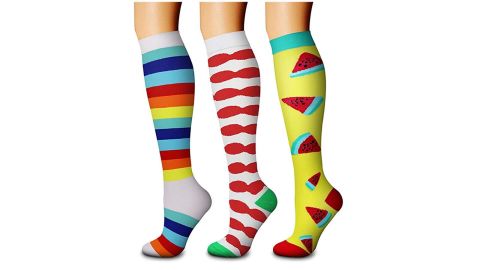
This set of three compression socks from Charmking not only provides ample support for your legs; they also don’t sacrifice on the style side of things. You can get the set in 35 different color combinations, so you can have a pair of compression socks to match your favorite pair of travel shoes. They offer a good amount of compression (15 to 20 mmHg) and are made from a lightweight, breathable fabric that will keep their shape no matter the setting.
From $9.98 at Amazon
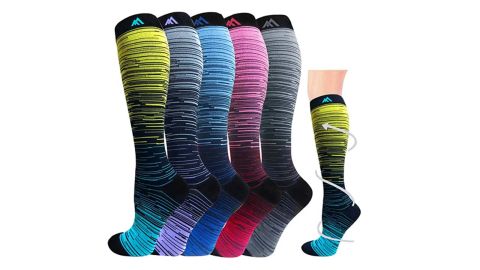
These machine washable socks feature copper, which is a great conductor of electricity and helps to circulate blood in your legs. They provide 20-30 mmHG of compression but are made from a breathable fabric to wick moisture away from your skin. Nearly 29,000 five-star reviewers on Amazon agree these socks work wonders.
From $8.99 at Amazon
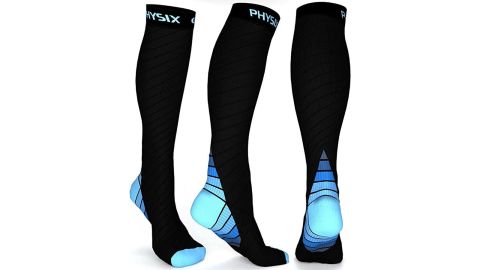
With more than 50,000 five-star reviews on Amazon, these compression socks from Physix have a loyal following — and for good reason. The socks’ 20-30 mmHg of compression and support is located in the heel and calves. Plus, they wash well without losing their compression and provide moisture-wicking properties to keep your feet cool and dry. The socks come in 11 different color options to best fit your style.
From $16.99 at Amazon
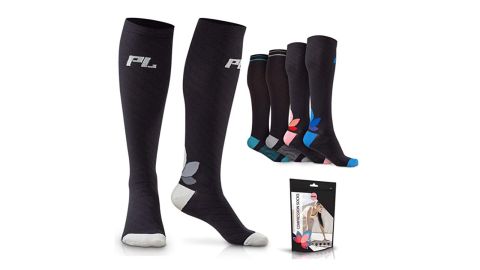
This pair of compression socks offers more compression than some others on this list — 20-30 mmHg — but still retains their comfort. The socks are made from a soft, breathable and lightweight fabric composed of nylon and spandex. A non-slip cuff at the calf makes sure your socks don’t slide down your legs during travel.
$11.97 at Amazon
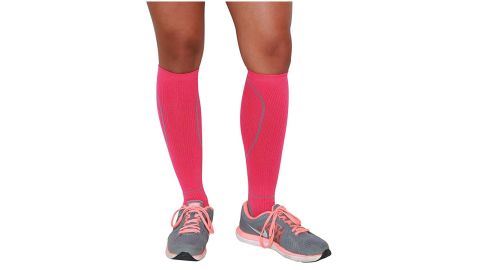
The Pure Compression Store Compression Socks are a well-loved and budget-friendly option popular among frequent flyers and those with leg fatigue and tendonitis. The graduated cotton socks are not as tight as comparable options, which makes them much more convenient to pull on and off on the go. They’re breathable too, made with cotton and copper.
$59.90 at Nordstrom
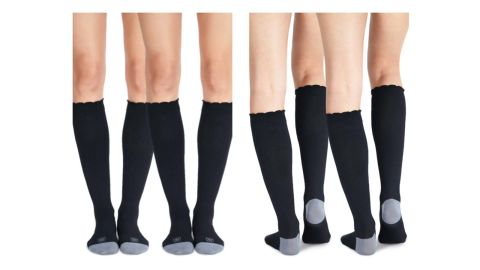
This two-pack of compression socks is made of a polyester, nylon, spandex and cotton blend. They’re knee-high and offer casual compression that will help to maximize circulation and reduce swelling. These could be a great addition to your packing list.
$18.94 at Amazon
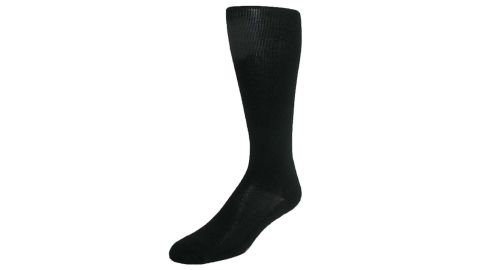
This pair of gradual socks will help to prevent circulation problems. They’re made of a Coolmax, spandex and elastic stretch material that works to support your legs from foot to calf. This pair can fit men’s shoe sizes 9 to 11.5.
“A graduated compression sock (gradual reduction in pressure as you move up the leg) can do wonders for those that experience swelling during flights or while sitting for long periods of time,” says Roach. “Not everyone experiences swelling during flights, but those with less active lifestyles or already have poor circulation can benefit from these sock features.”
From $19.99 at Amazon
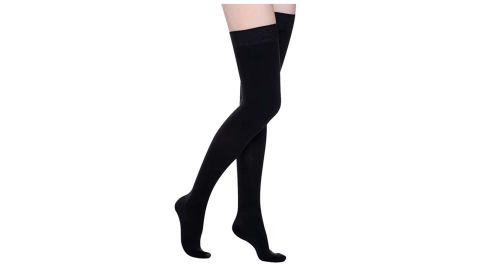
Thigh-high compression stockings aren’t for everyone, but if you tend to have painful swelling or discomfort in your legs and thighs while flying, this can be an option worth considering. The nylon-spandex blend and silicone lining helps to ensure stockings will stay in place without curling around the thighs or rolling down mid-flight.
Looking for a travel credit card? Find out which cards CNN Underscored chose as our best travel credit cards of 2022.
[ad_2]